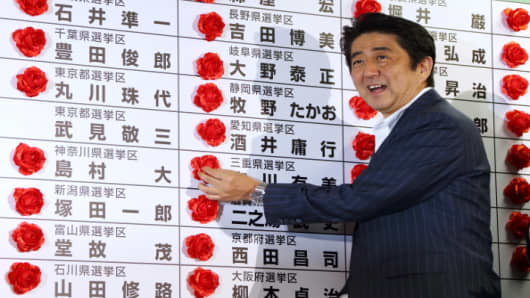The convincing victory by Shinzo Abe's ruling coalition in Sunday's election helps pave the way for long-awaited economic reforms, but only time will tell whether Abe seizes the opportunity to transform the world's third largest economy or follows the same path as predecessors and let reform efforts fizzle.
Abe's Liberal Democratic Party (LDP) and its coalition partner, the New Komeito party, won at least 74 of the 127 seats being contested in the 242-seat upper house election, Japanese media reported early on Monday.
The election is significant because it means the ruling coalition now has a majority in both houses of parliament, making it easier to push through changes.
(Read More: Now or never for consumption tax: Japan LDP member)
The win also raises the likelihood that Japan could get a leader who's staying the course. Since former Prime Minister Junichiro Koizumi ended his five-year term in 2006, no leader has been in office for longer than 15 months.
"It's all systems go now and the focus is very clear," Jesper Koll, head of Japanese equity research at JP Morgan Securities, told CNBC Asia's "Squawk Box." "The first six months of Abe's rule was all about getting a cyclical upturn, now it's going to be focused on getting a structural upturn so that Japan's potential growth rate can be revised up."






